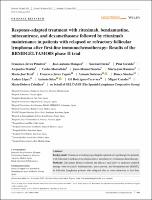| dc.contributor | Vall d'Hebron Barcelona Hospital Campus |
| dc.contributor.author | Peñalver, Francisco‐Javier |
| dc.contributor.author | Márquez, Jose‐Antonio |
| dc.contributor.author | Durán, Soledad |
| dc.contributor.author | Giraldo, Pilar |
| dc.contributor.author | Martín, Alejandro |
| dc.contributor.author | Montalbán, Carlos |
| dc.contributor.author | López Hernández, Andrés |
| dc.date.accessioned | 2020-07-31T12:38:44Z |
| dc.date.available | 2020-07-31T12:38:44Z |
| dc.date.issued | 2019-11-01 |
| dc.identifier.citation | Peñalver FJ, Márquez JA, Durán S, Giraldo P, Martín A, Montalbán C, et al. Response‐adapted treatment with rituximab, bendamustine, mitoxantrone, and dexamethasone followed by rituximab maintenance in patients with relapsed or refractory follicular lymphoma after first‐line immunochemotherapy: results of the RBMDGELTAMO08 phase II trial. Cancer Med. 2019 Nov 1;8(16):6955–66. |
| dc.identifier.issn | 2045-7634 |
| dc.identifier.uri | https://hdl.handle.net/11351/5127 |
| dc.description | Bendamustine; Follicular lymphoma; Immunochemotherapy |
| dc.description.abstract | Background: Consensus is lacking regarding the optimal salvage therapy for patients with follicular lymphoma who relapse after or are refractory to immunochemotherapy. Methods: This phase II trial evaluated the efficacy and safety of response-adapted therapy with rituximab, bendamustine, mitoxantrone, and dexamethasone (RBMD) in follicular lymphoma patients who relapsed after or were refractory to first-line immunochemotherapy. Sixty patients received three treatment cycles, and depending on their response received an additional one (complete/unconfirmed complete response) or three (partial response) cycles. Patients who responded to induction received rituximab maintenance therapy for 2 years. Results: Thirty-three (55%) and 42 (70%) patients achieved complete/unconfirmed complete response after three cycles and on completing induction therapy (4-6 cycles), respectively (final overall response rate, 88.3%). Median progression-free survival was 56.4 months (median follow-up, 28.3 months; 95% CI, 15.6-51.2). Overall survival was not reached. Progression-free survival did not differ between patients who received four vs six cycles (P = .6665), nor between patients who did/did not receive rituximab maintenance after first-line therapy (P = .5790). Median progression-free survival in the 10 refractory patients was 25.5 months (95% CI, 0.6-N/A) and was longer in patients who had shown progression of disease after 24 months of first-line therapy (median, 56.4 months; 95% CI, 19.8-56.4) than in those who showed early progression (median, 42.31 months; 95% CI, 24.41-NA) (P = .4258). Thirty-six (60%) patients had grade 3/4 neutropenia. Grade 3/4 febrile neutropenia and infection were recorded during induction (4/60 [6.7%] and 5/60 [8.3%] patients, respectively) and maintenance (2/43 [4.5%] and 4/43 [9.1%] patients, respectively). Conclusions: This response-adapted treatment with RBMD followed by rituximab maintenance is an effective and well-tolerated salvage treatment for relapsed/refractory follicular lymphoma following first-line immunochemotherapy. Clinical trial registration: ClinicalTrials.gov # NCT01133158 |
| dc.language.iso | eng |
| dc.publisher | Wiley Online Library |
| dc.relation.ispartofseries | Cancer Medicine;8(16) |
| dc.rights | Attribution 4.0 International |
| dc.rights.uri | http://creativecommons.org/licenses/by/4.0/ |
| dc.source | Scientia |
| dc.subject | Limfomes |
| dc.subject | Medicaments antineoplàstics |
| dc.subject | Prognosi |
| dc.subject.mesh | Lymphoma, Follicular |
| dc.subject.mesh | Antineoplastic Combined Chemotherapy Protocols |
| dc.subject.mesh | Prognosis |
| dc.title | Response‐adapted treatment with rituximab, bendamustine, mitoxantrone, and dexamethasone followed by rituximab maintenance in patients with relapsed or refractory follicular lymphoma after first‐line immunochemotherapy: results of the RBMDGELTAMO08 phase II trial |
| dc.type | info:eu-repo/semantics/article |
| dc.identifier.doi | 10.1002/cam4.2555 |
| dc.subject.decs | linfoma folicular |
| dc.subject.decs | protocolos de quimioterapia antineoplásica combinada |
| dc.subject.decs | Pronóstico |
| dc.relation.publishversion | https://onlinelibrary.wiley.com/doi/full/10.1002/cam4.2555 |
| dc.type.version | info:eu-repo/semantics/publishedVersion |
| dc.audience | Professionals |
| dc.contributor.authoraffiliation | [Peñalver FJ] Hospital Universitario Fundación Alcorcón, Alcorcón, Madrid, Spain. [Márquez JA] Hospital de Basurto, Vizcaya, Spain. [Durán S] Complejo Hospitalario de Jaén, Jaén, Spain. [Giraldo P] Hospital Universitario Miguel Servet, Zaragoza, Spain. [Martín A] Hospital Universitario de Salamanca, IBSAL, CIBERONC, Salamanca, Spain. [Montalbán C] Hospital Universitario Ramón y Cajal, Madrid, Spain. [López A] Vall d'Hebron Hospital Universitari, Barcelona, Spain |
| dc.identifier.pmid | 31573746 |
| dc.identifier.wos | 000488578100001 |
| dc.rights.accessrights | info:eu-repo/semantics/openAccess |

 Private area
Private area Contact Us
Contact Us







